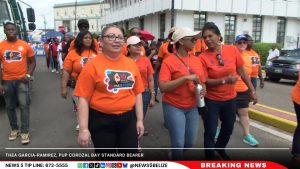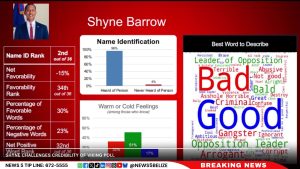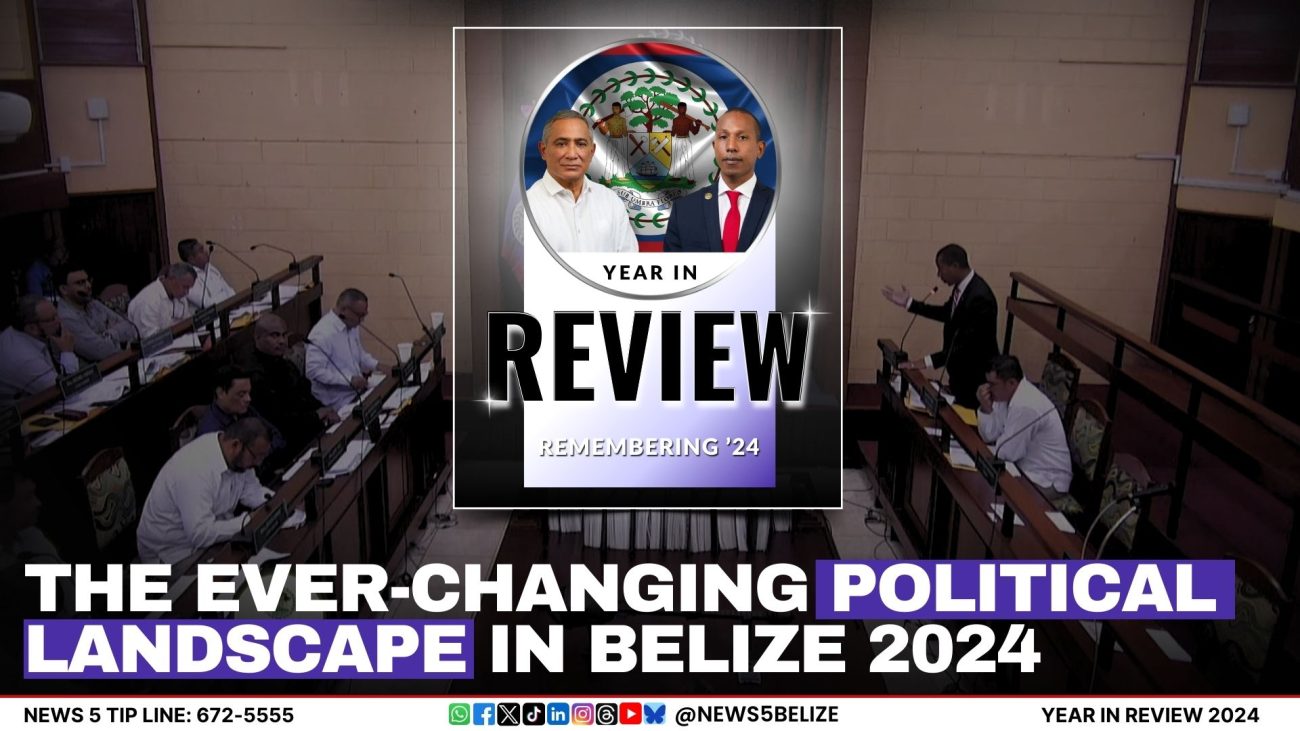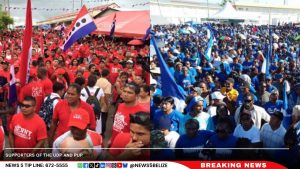The Ever-Changing Political Landscape in Belize 2024
As we wrap up 2024, News 5 is excited to bring you our digital Year in Review! This year, we're diving into the highlights and challenges of the past twelve months, all organized by themes. Join us as we look back at the stories that shaped our year…
The War for the UDP Leadership
In 2024, the United Democratic Party (UDP) in Belize became the epicentre of political drama, primarily between Moses “Shyne” Barrow and Albert Area Representative Tracy Taegar-Panton. They both claim to be the leader of the UDP. That particular case is before the court.
Barrow deemed Panton and other members who support her as “constructively resigned” from the UDP.
This discord led to the emergence of the Alliance for Democracy (AFD), a faction within the UDP challenging Barrow’s leadership and causing a notable rift within the party. The power struggle continues today.
The conflict intensified on October 20, 2024, when the AFD, led by Taegar-Panton, convened a “Unity Convention” at Belize City’s Civic Center. During this event, they declared Taegar-Panton as the interim leader of the UDP, asserting that the convention was held in accordance with the party’s constitution and represented the highest decision-making body of the party. Panton has the support of key UDP leaders such as Patrick Faber, John Saldivar, and Beverly Williams. This faction aimed to challenge Barrow’s leadership, accusing him of autocratic tendencies and calling for a leadership change to rejuvenate the party’s image and strategy.
In response, Barrow dismissed the convention’s legitimacy, maintaining his position as party leader. He labelled the AFD’s actions as unauthorised and took legal steps to reaffirm his leadership. This included initiating legal action against Taegar-Panton and her supporters to reclaim control over the UDP headquarters, which the AFD had occupied following their convention.

The physical manifestation of this power struggle was evident when Panton and her supporters took over the UDP headquarters in Belize City. This dramatic and symbolic act was aimed at asserting control over party assets, including media organs like Wave Radio and The Guardian Newspaper, which are pivotal for political communication. Barrow responded by accusing Panton of criminal activity and sought legal redress to reclaim the headquarters.
The internal conflict drew public attention, with both factions engaging in a war of words and legal maneuvers. Barrow’s attorneys reminded Taegar-Panton of court rulings that upheld his leadership, accusing her of defying these decisions. Despite these reminders, Taegar-Panton continued to assert her leadership role.
The convention organised by the AFD was not sanctioned by the party’s official leadership, leading to a public declaration by Barrow that he remained in charge, dismissing the convention’s outcomes as fraudulent.
Barrow, on his part, maintained his position as the legally recognised leader, supported by the UDP’s central executive. This dispute over legitimacy led to a legal tussle, with both factions seeking judicial clarity on who rightfully leads the UDP. The Belize High Court laid out a timeline to address the leadership disputes, with key decisions pending on whether Panton’s convention was valid and if she remained a member of the UDP.
UDP’s internal strife has weakened its position as the opposition, with criticisms from within and outside the party about the impact on democratic processes and party unity.
There Was Drama in the PUP Too
The political landscape of the Corozal Bay constituency changed in 2024 because of an intense internal struggle within the People’s United Party (PUP) between two prominent figures: Thea Garcia-Ramirez and Elvia Vega-Samos. At PUP’s standard bearer convention held in July 2024, Thea Garcia-Ramirez emerged victorious over the incumbent area representative, Elvia Vega-Samos. The convention was fraught with controversy, with Vega-Samos later alleging unfair practices, including the manipulation of the voter’s list and the inclusion of ineligible voters.

She claimed supporters were removed from the list, and there was coercion to vote for her opponent. Vega-Samos continued her public critique of the party’s handling of the convention, suggesting she was not given a level playing field. Her allegations led to a strong rebuttal from the PUP’s Secretariat, which dismissed her claims as “baseless” and warned her against further public statements without evidence. The tension escalated when Vega-Samos was allegedly asked to vacate the constituency office, which she had been using. This move was interpreted by Vega-Samos as an eviction, sparking further controversy. Garcia-Ramirez, however, clarified that she had extended an olive branch, suggesting a sharing arrangement for the office space. Prime Minister John Briceno and other party leaders, including Minister Kareem Musa, made public statements calling for unity within the party. They acknowledged Vega-Samos’s contributions but emphasised moving forward with Garcia-Ramirez as the new standard bearer.
Belize Rural South Area Representative, Andre Perez, was reinstated to Cabinet after a prolonged suspension. Perez resumed his role as Minister of Blue Economy and Disaster Risk Management following allegations of sexual misconduct by attorney Wendy Auxillou. Prime Minister John Briceño, addressing the matter on April 16, stated, “The investigation was that no laws were broken.” The Prime Minister defended his decision to bring Perez back, highlighting his efforts during municipal elections: “Minister Perez went into his constituency, worked hard, and… along with the mayor, Wally Nunez, they won by the largest margin ever in the history of San Pedro.” Despite this support, Perez faced a challenge within his party. San Pedro Town Mayor, Wally Nunez, had expressed his ambition to replace Perez as Belize Rural South’s area representative. Nunez, encouraged by his recent electoral success, announced on Facebook: “The people of San Pedro and Caye Caulker have been asking for quite some time now if I will represent them in the general elections. Well, this is [a] testament that I will be sending in my application to represent you all! Let democracy prevail!” In their most recent elections, Perez had secured 4,336 votes (62.96%) in the 2020 general elections, defeating his UDP opponent, Manuel Heredia Jr., who garnered 2,419 votes (35.12%). Meanwhile, Nunez won 3,651 votes in the 2024 municipal elections, significantly outpacing his UDP opponent, Wilfredo Alamilla, who received 1,319 votes. Nunez also increased his margin of victory by 189 votes compared to the 2021 municipal elections. However, Nunez’s ambitions were ultimately curtailed by internal party dynamics. The PUP executive declined to grant him permission to challenge Perez for the party’s candidacy. Nunez later acknowledged this decision on Facebook, writing, “Guided by the voice of the people, I decided to continue leading them as their area representative. I have now been made to understand that this will not be possible. I respect the decision of our party and hold dear the mandate given to me by the people.”

One of Belize’s longest-serving politicians, Michael Espat, affectionately known as “Iron Mike,” passed away on Monday night in Belmopan. Espat died at the Western Regional Hospital, reportedly after suffering a massive heart attack. C.E.O. Osmond Martinez Dr. Martinez quickly announced his intention to run and replace Espat. That did not sit well with Cayo South Area Representative Julius Espat. Espat stated, “He was disrespected. His C.E.O. went out to do something that was not authorised by the executive of the People’s United Party. I am an executive member, and nothing was told to us, and he was disrespected. His dignity was taken away, and that’s not good for anybody.” A by-election was held with Dr. Martinez emerging as victorious.
Third Parties, Again
In 2024, two notable (or some might say insignificant) third parties were launched: the People’s Democratic Movement (PDM) and the Belize Justice Movement (BJM). PDM, led by Estevan Perera Senior, contested the seats at City Hall with the hope of forming the next Belize City Council. They lost. BJM officially took the stage in early 2024 with a clear focus on social justice. Their campaign rhetoric centred on addressing the disparities in wealth, improving social services, and combating corruption. We have yet to see how they will do in this year’s general election. Then there is the Belize Progressive Party (BPP). The BPP made its electoral debut in the November 2015 general election, in which it fielded 25 candidates and captured 1.63 percent of the vote nationwide (2,336 votes). Their campaign emphasised the need for completed redistricting before any elections, aiming to address the long-standing issue of unequal constituency sizes, which they argued skewed political representation. No BPP candidate has won an election.
A Very Important Political Legal Case
Cayo North’s U.D.P. standard bearer, Omar Figueroa, alleged widespread voter registration fraud in the Cayo North constituency. Figueroa claimed that election officials failed to address numerous questionable registrations. In a letter addressed to Governor-General Froyla Tzalam, Figueroa alleged a “well-organised white-collar criminal scheme” involving questionable voter registrations, describing it as a “threat to our fragile parliamentary democracy.” He criticised the registration department for not providing essential information to verify new registrations and suggested that some employees might have been complicit in the fraud. Concerns surfaced before the 2024 municipal elections when both Figueroa and Mayor Earl Trapp noticed “unusual” registration activities at the local Elections and Boundaries Department. Figueroa stated that “significant numbers of questionable registrations began appearing on the voter’s list without clear indication as to the exact address.”

Figueroa called for a thorough investigation by the Commissioner of Police and other officials to safeguard the rights of Cayo North residents.
Figueroa also sent a letter to Chief Elections Officer Josephine Tamai, urging her to comply with a court ruling to remove over twenty names from the voter’s list, as determined by the San Ignacio Magistrate’s Court. He accused Minister Michel Chebat’s team of fraudulently registering voters in Cayo North. When News Five contacted Chebat, he declined to comment, citing the court’s ruling as currently under appeal in the High Court. Chebat explained that the Election and Boundaries Department could not act on the ruling until the appeal was resolved but expressed willingness to discuss the matter once the case concluded.
Chief Elections Officer Josephine Tamai responded, emphasising that the Election and Boundaries Department operated under the Representation of the People’s Act, which outlined procedures during any objection or appeal process. Tamai noted that the department rejected Figueroa’s claims, citing that over one hundred people he accused of being fraudulently registered were upheld by the court.
Over one hundred voters attempting to transfer to Cayo North were ordered to remain in their current constituencies. This followed Figueroa’s objections, which led to a San Ignacio Magistrate Court review. The magistrate, after inspecting some addresses, forwarded the case to the High Court, leaving the final decision pending.
The Belize Poll 2024
The Belize Poll 2024, conducted by Viking Strategies, offered valuable insights into the political landscape of Belize and revealed the popularity of key politicians as well as the public’s concerns. The survey, which included 968 registered voters, was carried out between June 17 and August 6, 2024, and examined various issues, including satisfaction with life in Belize, economic stability, crime, and corruption. One major concern highlighted by the poll was crime, with over 33% of respondents citing gang violence as the primary issue.
The poll also indicated a decline in economic confidence, with many Belizeans expressing concerns about corruption. However, the current People’s United Party (PUP) administration received praise from 68% of respondents for infrastructural improvements. Regarding the economic situation, respondents reported that while they could afford basic necessities and some extras, major purchases like cars remained out of reach. This shift represented a positive change from five years ago when many were struggling to pay utility bills. When it came to the perception of corruption, 30% of respondents believed it to be widespread, while the majority felt it was somewhat present. Notably, in the 2020 general election, Briceño, then the opposition leader, promised to combat corruption, declaring that the government could no longer operate as it had under the United Democratic Party (UDP).

The survey also ranked Belize’s politicians based on favorability. While both Prime Minister Briceño and UDP Leader Moses “Shyne” Barrow were well-known, Briceño emerged as the more favourable leader, ranking sixth out of 36 politicians. Barrow, in contrast, was ranked 34th in favorability despite being the second most recognised politician. Cordel Hyde, the area representative for Lake Independence, was ranked as the most favoured politician, followed by Kevin Bernard and Kareem Musa in second and third places, respectively. Tracy Panton was the only UDP politician in the top ten.
The poll also revealed the least favourable politicians, with John Saldivar topping the list, followed by Gilroy Usher and Michael Peyrefitte. Patrick Faber, ranked third in recognition, placed sixth in favorability. When asked about voting intentions for the 2025 general election, the majority of respondents expressed a preference for the PUP, suggesting a narrow victory for the party with 41% of the anticipated vote.








Facebook Comments